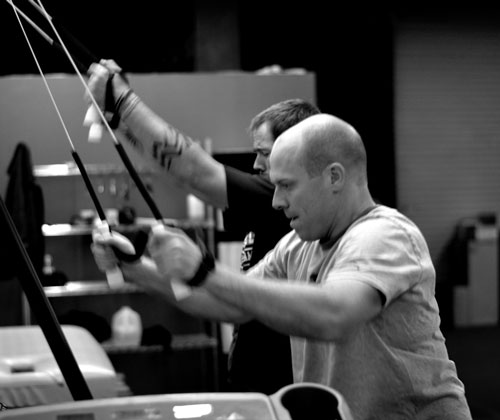Unlike the clichés that the fitness industry throws out there, we don’t believe you need to just work harder.
If it were that easy, you’d already be doing it. I’m guessing that if you’re reading this you don’t spend twelve hours a day sitting on your ass playing video games. You’re probably a busy adult living your life, trying to do the best you can and looking for ways to do better. For me to tell you that you should just be working “harder” is more than a little condescending.
You know how to work hard. What you need is to figure out the balance of nutrition, exercise and recovery what works for you.
Making change isn’t about making right and wrong or good and bad choices. It’s about making small improvements over time. And contrary to everything the fitness industry tells you, small improvements don’t mean more and more work. It means different decisions and actions. Not more, but different.
If you want to be healthy and capable you will have to work hard, at times. And you will have to make sacrifices, at times. However, life should be enjoyed, and it attaining these things shouldn’t require a Puritan attitude of silent suffering.
Let’s dive in and talk about how we you can make different decisions that lead to change.
How the body adapts
The first step of making different decisions is having an understanding of what decisions you can change that will actually lead to positive changes. And to understand that, we need to talk about how the body adapts to changes in your lifestyle.
You have to balance stress and recovery in order for the body to positively adapt to any training you do or nutrition changes you make. I say positive because your body is always adapting – whether you prioritize balancing distress and eustress or you don’t your body finds a way to keep you alive. The consequences of having this balance out of whack the short time might be a lack of energy, ability to focus, poor physical performance, carrying around a few extras pounds and the long term it leads to more severe consequences like auto-immune disorders, diabetes, heart disease and other chronic diseases.
Most clients of ours walk into the gym in a chronic state of semi-fatigue; inhibiting their ability to perform at their full potential. More importantly, it prevents them from receiving the benefits of the positive actions they are taking – working out and eating a healthier diet.
As I mentioned before the body is always adapting to the stresses placed upon it. Recovery (think sleep, nutrition, and other restorative activities) must outweigh stress (emotional and cognitive strain, working out) over time or the body won’t positively react to the positive activities you are doing.
Instead of doing more, most people would benefit from focusing on balancing out this equation first. And that typically means managing stress, and improving recovery based activities such as sleep and nutrition. As soon as you balance out the equation, your body will start positively adapting to your workouts and nutrition changes.
You get more out of doing less – or more accurately, doing things differently. Plus, you feel good! You have more energy, your joints and muscles hurt less, and the world seems like a better place.
Making time
You can’t add new activities (workouts, more sleep, de-stress time) without subtracting time spent on something.
You’re going to have to give something up.
You’re filling up your 24 hours right now, so in order to add a new activity to their lives they have to exchange one activity for another. That could be reducing the time spent:
- Watching TV
- On Facebook, Instagram, Twitter, Pinterest, etc
- Texting or talking on the phone
- Anything else that is generally “time filler” type activities
It doesn’t really matter, but you will have to cut something in order to add a new activity.
The first thing we have our clients do is a time inventory: they write down everything they spend time on for three days. Once they have this list we ask them what item they could reduce or give up in order to fit in their new recovery or workout related behavior.
Do something you love
The next step is to find a deeper reason for training, eating well, or making any changes. I used to love working out. Unfortunately, that love affair was a brief tryst that only lasted a few years in my late teens and early twenties.
Today, I don’t loathe working out, but I don’t love it either. But, I still workout consistently, eat well, and value down time and managing stress.
Instead of focusing on how much working out or not eating whatever I want sucks, I focus on what it does enable me to do. If you find something you love, the real reason for being fit and healthy, the work to get there isn’t so bad anymore. I talk more on this in this video.
Wrap Up
You can feel better without “doing more”. By making small adjustments in your behavior you can consistently improve without feeling overwhelmed.
